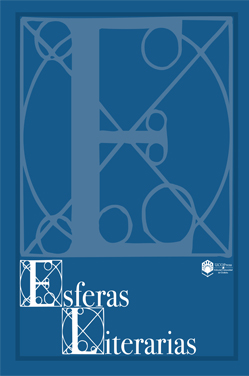«Hamnet», de Maggie O'Farrell: un estudio crítico-biográfico de la obra de William Shakespeare, «Hamlet»
Contenido principal del artículo
Resumen
El objetivo de este ensayo es contribuir a la comprensión de la tragedia Hamlet (1603), de William Shakespeare, mediante una reconsideración crítica de episodios biográficos, como el hueco funcional que el dramaturgo dejó en su familia. Para ello, se examinarán dos textos, Hamnet (2020), de Maggie O’Farrell, y el propio Hamlet, de Shakespeare, leyendo el primero como una interpretación crítico-biográfica imaginativa del segundo. La atención se centrará en la vida familiar de Shakespeare, particularmente en su hijo Hamnet y en la relación que éste mantiene con su padre en la obra de O’Farrell. Utilizando el texto dramático como fuente textual primaria, se llevará a cabo una minuciosa interpretación comparativa de ambos textos literarios. El análisis de pasajes clave de esta novela apoyará la hipótesis de que Hamnet puede considerarse una interpretación crítico-biográfica del Hamlet de Shakespeare.
Descargas
Detalles del artículo

Esta obra está bajo una licencia internacional Creative Commons Atribución-NoComercial-SinDerivadas 4.0.
Citas
Ackroyd, Peter (2005), Shakespeare: The Biography, London, Vintage Books.
Adler, Alfred (1965), La psicología individual y la escuela, Buenos Aires, Losada.
Albarracín, Dolores; Sunderrajan, Aashna; Dai, Wenhao; White, Benjamin X. (2019), «The social creation of action and inaction: From concepts to goals to behaviors», Advances in Experimental Social Psychology, Academic Press Inc., pp. 223-271, <https://experts.illinois.edu/en/publications/the-social-creation-of-action-and-inaction-from-concepts-to-goals>. DOI: https://doi.org/10.1016/bs.aesp.2019.04.001
Bate, Jonathan (2011), Shakespeare and Ovid, Oxford, Oxford University Press.
Bevington, David (ed.) (1992), The complete works of Shakespeare, New York, Harper Collins.
Bevington, David (2010), Shakespeare and biography. Oxford University Press. DOI: https://doi.org/10.3366/edinburgh/9780748635238.003.0007
Bowlby, John (1982), «Attachment and loss: retrospect and prospect», American journal of Orthopsychiatry, 52 (4), p. 664. DOI: https://doi.org/10.1111/j.1939-0025.1982.tb01456.x
Bloom, Harold (1986), William Shakespeare’s Hamlet, New York, Chelsea House Publishers.
Bloom, Harold (1995), «Freud: Frontier Concepts, Jewishness, and Interpretation», in Cathy Caruth (ed.), Trauma: Explorations in Memory, Baltimore / London, The John Hopkins University Press, pp. 113-127.
Bloom, Harold (2003), Hamlet: Poem Unlimited, New York, Riverhead Books.
Brooks, Geraldine (2020), «Shakespeare’s Son Died at 11. A Novel Asks How It Shaped His Art», The New York Times, <https://www.nytimes.com/2020/07/17/books/review/hamnet-maggie-ofarrell.html>.
Burgess, Anthony (1964), Nothing Like the Sun: A Story of Shakespeare’s Love-life, London, Heinemann.
Charles, Ron (2020), «Review | Maggie O'Farrell's 'Hamnet' Reimagines the Life and Death of Shakespeare's Only Son», The Washington Post, WP Company, 21 July, <https://www.washingtonpost.com/entertainment/books/maggie-ofarrells-hamnet-reimagines-the-life-and-death-of-shakespeares-only-son/2020/07/20/c949592e-ca95-11ea-91f1-28aca4d833a0_story.html>.
Duncan-Jones, Katherine (2001), Ungentle Shakespeare: Scenes from his life, vol. 40, Cengage Learning EMEA.
Evans, Dylan (1996), An Introductory Dictionary of Lacanian Psychoanalysis, London / New York, Routledge.
Freud, Sigmund and Strachey, James (1996), The interpretation of dreams, vol. 4, New York, Gramercy Books.
Friend, Stacie (1997), «Fictional characters», Philosophy Compass, 2 (2), pp. 141-156, <https://doi.org/10.1111/j.1747-9991.2007.00059.x>. DOI: https://doi.org/10.1111/j.1747-9991.2007.00059.x
Fripp, Edgar I. (1929), Shakespeare Haunts Near Stratford. Oxford and London, pp. 19-20.
Frye, Northrop (1988), Northrop Frye on Shakespeare, Yale University Press.
Greenblatt, Stephen (2004), Will in the World: How Shakespeare Became Shakespeare, W. W. Norton & Company.
Mairet, Philip. (1969) «Hamlet as a Study in Individual Psychology», Journal of Individual Psychology, 25 (1), pp. 71t, <https://www.proquest.com/scholarly-journals/hamlet-as-study-individual-psychology/docview/1303443954/se-2>.
Laslett, Peter (1965), The World We Have Lost, Methuen & Co. Ltd, pp.2-3.
O’Farrell, Maggie (2020), Hamnet, London, Headline Publishing Group.
Partee, Morriss Henry (2006), Childhood in Shakespeare's plays, Peter Lang.
Shakespeare, William, et al. (2008), Hamlet, Oxford University Press.
Shakespeare, William (2014), Arden Shakespeare complete works, Bloomsbury Publishing.
Shakespeare, William (1990), King John, Ed. L. A. Beaurline, Cambridge. DOI: https://doi.org/10.1017/9781139836500
Stone, Lawrence (1977), The Family, Sex and Marriage in England 1500-1800, New York, Harper & Row, 1977.
Wilson, J. Dover (1959), What happens in Hamlet, Cambridge University Press.




